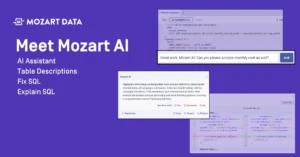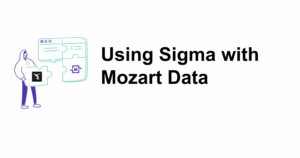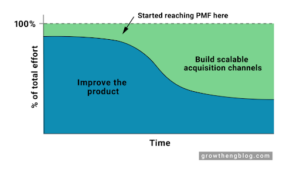What Are ETL Tools?
Today, organizations of all sizes and sectors generate massive volumes of data beyond the understanding of any one individual. Unfortunately, without an easy way to properly handle and evaluate that data, valuable data-driven ideas will get lost in the shuffle. As a result, it’s crucial to find an Extract, Transform, and Load (ETL) tool to help you transfer clean data and move it into a data warehouse that will let you analyze it more easily.
Getting the right ETL tool for your company is critical since it will enable you to integrate and enhance data from all the various sources that are relevant to your business. It can also help you to conduct innovative analyses and develop innovative insights for your customers.

Finding the right ETL app might be a bit time-consuming at first, but it’ll pay off in the long run. You’re much better off spending a little extra time up front than having to rework your whole data transformation process down the line, especially if you’re already operating at scale. If you have clear, well-defined objectives, it won’t be hard to identify the ETL technology that best meets your needs.
An ETL tool is a process that collects data from a variety of Relational Database Management Systems, modifies it uniformly to make it easy to understand, and puts it into the data warehouse in a nice clean structure set up for analysis. Here are some of the best ETL tools you can use in your business.
1. Mozart Data
C’mon, you knew whose blog you were on — it’d be marketing malpractice if we didn’t toot our own horn a little. No, Mozart isn’t strictly an ETL tool, but we can help you automate the process of extracting, transforming, and loading your data into a warehouse all in one central tool.
We’ll help you import, clean, and analyze your data all in one central place instead of making your (expensive) data professionals connect it all manually. While most data companies specialize on a single part of the data analysis process, Mozart helps you seamlessly combine all those tools into one modern data stack. This makes it easier than ever to combine and clean data, which can get complicated in a hurry if you need to combine more than two sources, so your team can focus on business intelligence (i.e. drawing actionable insights about how to improve your business from the data you’ve collected). Mozart lets the “business people” — like executives, sales, and marketing — get direct access to the information they need, when they need it, and lets your data analysts and engineers focus on higher level tasks.
Pros
– So easy your executives can use it
– Gathers all your data tools in one place
– Accelerates the gathering of business intelligence
– Quick, easy, and secure
Cons
– You do still need to know a bit of SQL to set it up, although it’s easier after that
– It’s not an all-in-one tool, it’s a modern data stack to make collecting and analyzing data accessible to everyone on your team
2. Xplenty
Xplenty is a cloud-based ETL system that provides easy-to-understand data streams for automating data flows from various origins. It also handles data flows and data scheduling, while also processing both structured and unstructured data. Customers can clean, standardize, and convert their data while complying with best practices thanks to the company’s sophisticated on-platform transformation tools.
Xplenty enables the centralization and preparation of data for Business Intelligence (BI). It also allows the transformation and moving of data between internal databases. This tool also sends additional third-party data to Salesforce directly. Furthermore, it’s the only tool that transfers data from Salesforce to Salesforce, thus saving your business. Lastly, it supports a rest Application Programming Interface (API) connector to collect data from any rest API.
Pros
– Simple and easy to navigate graphical user interface
– An emphasis on data security
– Excellent customer service
– Scalable
Cons
– It might be not easy to send data in portions
– Sometimes error messages are not clear
3. Talend
Talend Data Integration is a fully accessible ETL data integration tool. The Talend system works with both on-premises and cloud data sources. It also comes with many pre-built connectors. This program has some of the most outstanding data management and integration tools in the market. While the open-source Talend version may be suitable for specific users, bigger businesses will certainly choose Talend’s Commercial Data Management Platform. The premium version has additional tools and capabilities for design, production, administration, analytics, and data governance.
Some of the features that make Talend desirable are easily deployable in a business environment: the drag and drop interface, the ability to merge and transform traditional and big data into Talend Open Studio, and the online community’s availability for technical support. It also has many inbuilt components that enable the connection of different data sources and improves productivity and time required for data deployment.
Pros
– Connects databases easily on different platforms
– The software works efficiently with other formats like Comma-Separated Values
– The JAVA technology makes it easier for users to integrate multiple scripts from various libraries worldwide
– Clear and easily understandable interface
– It works so fast when transferring data
Cons
– Requires high levels of customization that may need a JAVA expert
– Talend Open Studios are not readily available; thus hard to run Tier 1 applications
– Talend Open Studios do not have a suitable means of carrying out unit testing of components
– Talend Open Studios lack enough features for duplication and fuzzy matching using machine learning
4. Improvado
Improvado is among the best ETL tools because it’s flexible and straightforward to use. It was developed to make it easy for marketers to gather all their data in one location. As a result, there’s no need for coding for data automation. Due to its simplicity, there is no need for implementers or data pros to help you make changes. It’s suitable for people in the e-commerce sector, healthcare, and gaming. The connections go deep, bringing in specific data for each search term and advertisement level to provide a comprehensive view of your operation.
Improvado has dedicated customer service representatives to support every plan. The representative will collaborate with you to design dashboards and connectors for data to be shown as you want. You have the option of seeing your data within the Improvado dashboard instead of extracting and downloading it. You can then transfer it to a data warehouse or visualize it in your preferred BI tool, such as Tableau or Looker.
Pros
– Supportive customer care representatives
– No need for developers
– Reduces manual reporting time
– Puts your data in one location at a fast speed
– Easily customizable at your request
– You can be able to view advertisement creatives from your dashboard
– Suitable for advertising businesses operating with many clients
– Great for brands managing to spend across digital marketing channels
– Marketing integrations run deep and are also granular. Therefore, you can see data at a keyword or advertisement level
– Able to normalize exported metrics for creation of customized metrics and mapped data for all platforms
– Can handle complex data at scale
Cons
– Some of the features that are granular can be a bit complex to understand
– To get dashboards and reports in a way that you visualize, you may have to engage a little bit more with your customer care representative
5. Alooma
Alooma is an ETL tool for data migration for data warehouses in the cloud with unique built-in tools for data integration. It has a live data streaming display, a coding sidebar, and other useful end-user services. The most significant advantage of Alooma is that it automates most data flow, allowing you to concentrate on the outcomes rather than the technical intricacies.
Users can conduct the most valuable operations using the default menu buttons, such as adjusting settings and seeing the dashboard. It’s suitable for companies seeking to move their data into the cloud after cleansing it for more accessible data retrieving. The Alooma platform offers horizontal scalability, allowing you to handle as many events as you need while incurring only a minor cost change.
The program also integrates and transforms data using state-of-the-art technologies to make it user-friendly.
Pros
– The software operates efficiently even with multiple data sources
– It automatically detects the schema of the database
– Monitors any problems in the database at a fast speed
– Managers may evaluate and manipulate all data sources from a single window
– Allows for simple replication of shared databases on the market
Cons
– The Graphical user interface may be a bit complicated if you are a first-time user
– The debugging module is not as user-friendly as other products on the market
6. Starfish
Starfish is a great ETL tool for marketing because of its ability to easily provide usable customer insights. Starfish assists businesses in improving customer targeting by aggregating data from their Customer Relationship Management (CRM) and gaining insights into their consumers. The system pulls sales and other customer-related data from the CRM module and relates it to support operations like finance. By knowing what your clients expect from you, you can provide them with a specialized package or improve the quality of your goods and services to maintain their loyalty. Therefore, your business can generate a lot of profits at the end of the day.
The Starfish dashboard is quite simple to use and assists customers in creating valuable reports for marketing initiatives and product launches. Therefore, for companies that rely on customer response, this is the best tool to use. The feedback given by customers is collected from social media pages like Facebook and Twitter and relayed into the ETL system so that you can be aware of your customers’ expectations and take the necessary actions.
Pros
– Easy to use and understand
– A flexible and reliable system that may be readily integrated with any database
– User feedback is taken into consideration
– A specialized staff of customer service representatives to respond to consumer inquiries
Cons
– The system is not capable of handling a vast data move
– Can be a bit slow in data transferring data
– It can be a bit expensive for some businesses
7. Jaspersoft
Jaspersoft is among the most effective business intelligence software programs in the market currently. It’s designed to scale to the most significant levels of data quantities and process complexity while supporting one or many developers. In addition, this ETL tool can seamlessly interact with Hadoop, Google Analytics, and Cassandra, among other standard data management platforms.
Jaspersoft can come as a software as a service (SaaS). This service implies the tool is cloud-hosted, and people can utilize it to accomplish their data processing tasks without installing it locally. As a result, Jaspersoft is among the cost-effective ETL marketing solutions available. Therefore, this marketing tool can be used by any business organization regardless of size.
The software also comes with many pre-built insights that may be examined as needed. In addition, Jaspersoft software experts have also released a smartphone app that enables customers to monitor their data from any place.
Pros
– Excellent web interface with colorful and dynamic reports
– A responsive customer service staff
– Various diagnostic resources for rapid software repairs are available
– It’s also possible to connect to non-standard data sources
Cons
– Frequently used as a SaaS with high bandwidth requirements
– There are no predictive analytics tools included
– Knowledge of Excel is necessary to customize the tool
8. Supermetrics
Supermetrics allows users to collect data from various social marketing channels, such as Google Ads, Facebook, and other social media platforms, and directs it into one destination like Google Data Studio and analytics modules can provide insights into customer choices about certain goods and services.
Pros
– One of the most effective tool for measuring social media marketing
– Focused on reviewing insights rather than creating reports, thus saving the user time
– It features a bright and simple-to-use marketing dashboard
– it’s simple to integrate with approximately 50 different data management solutions
Cons
– Some issues are difficult to detect on your own
– On the Insights page, there may be too much information displayed at once
9. Domo
Domo is one of the most comprehensive analytics software packages on the market today. It collects data from various sites and channels and presents it to customers in an easy to understand format. The tool provides a visual interface that allows users to combine any data sources. Customers may generate new integrated datasets in sequential drag & drop stages. They then configure the actions, give the output a name, check the data for accuracy, and schedule the process. The newly formed dataset will be dynamically renewed when any of the supplied datasets are updated.
Businesses may develop a user-friendly interface across many elements of their company, from dealers to workers to clients, with this ETL marketing tool. The software is also cloud-hosted and can even be run from your smartphone in a pinch.
Pros
– Machine learning is used to make smart business decisions
– Data transmission doesn’t need a large amount of bandwidth
– A comprehensive operating system that assists businesses in making real-time choices
Cons
– Managing datasets may be challenging at times
– Individual users may be overwhelmed by the software’s many features, as it’s primarily geared for business users
10. Datorama
Datorama is an ETL marketing solution that takes a comprehensive approach to gathering a company’s advertising data. Pulling information from a variety of sources helps you to conduct more efficient sales and business promotion campaigns. Data integration, activation, and insights are the software’s three core engines.
This software’s Artificial Intelligence architecture is one of its most important aspects since it does sophisticated calculations utilizing a large quantity of data to assist organizations in getting new consumers and maintaining existing ones.
Pros
– Platform integration and data analysis are made simple with this user-friendly interface
– On the program dashboard, there are several report alternatives
– Artificial intelligence-based real-time automation
– A centralized system that allows numerous modules, such as CRM and digital advertising, to be integrated
Cons
– For first-time users, software setting might be challenging
– Some clients choose a per-client pricing model over a per-user pricing model
ETL tools are necessary for businesses to efficiently manage their data and present it in a way that’s easier to analyze. These tools will also allow you to discover valuable insights about the needs of your customers. ETL tools can help you combine data from lots of different platforms, including social networking websites, datasheets, and end-user computers, into a central data warehouse using fast data transformation and migration capabilities. That will help you access your information all in one place, cleaned, transformed, and ready for you to analyze. Hopefully we’ve helped you learn what you need to know to determine the best ETL tool for your business.


